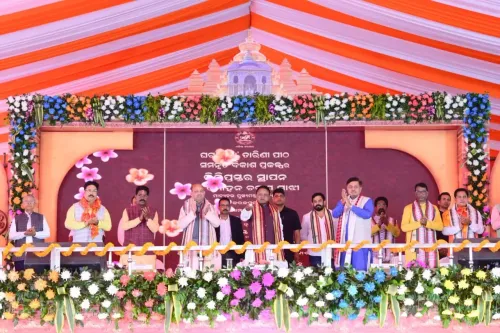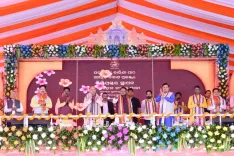Was the Pahalgam Attack a Strategy to Undermine J&K's Stability and Boost Cross-Border Terrorism from Pakistan?

Synopsis
Key Takeaways
- Pahalgam attack aimed to disrupt normalcy in Jammu and Kashmir.
- India launched Operation Sindoor in retaliation.
- Attack targeted tourism and economic development.
- Precision strikes aimed to minimize civilian casualties.
- Comparison with 26/11 Mumbai attacks highlights severity.
New Delhi, May 7 (NationPress) Foreign Secretary Vikram Misri stated that the Pahalgam terror attack on April 22 was a deliberate move to disrupt the ongoing normalization efforts in Jammu and Kashmir and to foster conditions that support ongoing cross-border terrorism from Pakistan.
During a press briefing with Indian Army Colonel Sofiya Qureshi and Indian Air Force Wing Commander Vyomika Singh, Misri spoke about the intentions behind Operation Sindoor, where Indian troops targeted nine significant terror locations deep within Pakistan and Pakistan-occupied Kashmir (PoK).
“On April 22, 2025, terrorists trained by Pakistan and affiliated with Lashkar-e-Taiba viciously attacked Indian tourists in Pahalgam, resulting in the tragic loss of twenty-five Indians and one Nepali citizen,” he remarked.
He drew comparisons to the 26/11 Mumbai attacks, noting that “this incident marks one of the gravest terrorist acts in terms of civilian casualties since the November 26, 2008, attacks in Mumbai.”
The Pahalgam attack was described as particularly heinous, with victims shot at close range in front of their families. Misri remarked, “This brutal method was intended to psychologically torment the victims' families and send a message.”
He highlighted the strategic aim of the attack, explaining, “The assault was clearly designed to hinder the restoration of normalcy in Jammu and Kashmir, as tourism had begun to thrive once more. The ultimate goal was to stifle this progress.”
Misri pointed out the attack's economic implications, stating, “As we know, over 2.25 crore tourists visited Kashmir last year. Therefore, the objective was likely to hinder the Union Territory's development and create an environment favorable for ongoing cross-border terrorism from Pakistan.
In direct retaliation to the Pahalgam incident, India initiated Operation Sindoor, targeting the terror infrastructure utilized by groups based in Pakistan, including Lashkar-e-Taiba and its affiliate, The Resistance Front.
The military strikes concentrated on camps and logistical centers believed to be involved in orchestrating the attack.
Misri underscored India's military approach as “measured, calibrated, and non-escalatory.” He reaffirmed that the strikes were aimed solely at dismantling terrorist strongholds, ensuring minimal collateral damage to civilian and economic targets.
“The Indian armed forces executed precision strikes. The objective was to eliminate the roots of terrorism without triggering further escalation,” Misri concluded.










